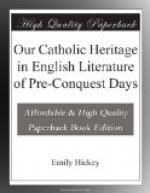And then comes the preaching of the true penance. “Let us do what is needful, bow to the right, and in somewise forsake the wrong, and mend where we have broken.” And the preacher’s voice now takes the tender tone of entreaty. “Let us creep to Christ and with trembling heart often call upon Him, and deserve His mercy; and let us love God, and obey His laws, and fulfil what we promised when we received baptism; or what those promised who were our sponsors at baptism. And let us rightly order word and work, and earnestly cleanse the thoughts of our hearts, and carefully keep oath and pledge and have honesty among us without weakness, and let us often understand the great judgement which we all must meet, and earnestly protect ourselves against the burning fire of the punishment of hell, and earn for ourselves the glories and the joys which God has prepared for them that do His will in the world. God help us. Amen.”
CHAPTER XIII
Love of books is love of part of God’s world. In books we commune with the spirit of their writers. The Church the mother of all art and all literature. Catholic literature saturated with Holy Scripture.
A man who made many a man and woman love literature and helped them to study it, the late Professor Henry Morley, has said that one who thinks that a bookroom is not a part of the world; one who thinks that, in leaving his books and going forth to commune with nature he is, as it were, passing from death to life, is one who has not yet learned to read. The good Professor saw that books have souls in them, so to speak, and that to love a book really and truly is to hold communion with that which is living and is a part of the great, beautiful scheme of God’s great, beautiful world. To love one part of what Our Father has given us should never lead us to despise, or even undervalue, other parts. And we must remember, too, must we not? how one thing helps us to understand another; how great painters and great poets help us to understand the beauty of nature as we might not have understood it without them, just as they help us also to know men and women, and help us to know better some of the fair things in our great and glorious religion; things which God can and does teach without their help when He chooses, though He graciously and lovingly often uses their help—the help He has given them the power of giving—to teach others of His children. Our Father, being Our Father, not just your Father and my Father and his Father and her Father, but Our Father, the Father of us all as one big family of His, brothers and sisters in Him, wills that we all help one another with the gifts He has given us; and the more we can realise that all separate gifts are parts of one great harmonious whole, the more fully we shall live and feel and enjoy.
There is, of course, a delight in exquisite typography, and hand-made paper, and binding into which the soul of a true artist has gone. People may be willing to give large sums for these things, independently of the value of what is under them; or people may value books for their age, or because they are rare, or because they are records of facts which it is well to know and good to be able to verify.




